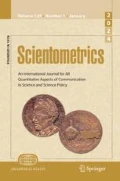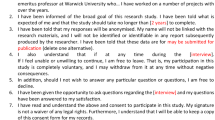Abstract
This paper demonstrates the ways and degrees to which contemporary, U.S.-based, employed or retired ecologists aggregate into guild-like groups on the basis of their valuations of 15 professional traits. Principle components analysis of survey data from 904 Ecological Society of America respondents led to five emergent factors from the 15 traits: ‘enjoying nature,’ ‘preserving nature,’ ‘questing for knowledge,’ ‘possessing epistemic expertise,’ and ‘accepting religious foundations for valuing nature.’ Subsequent cluster analysis on these factors yielded four groups of respondents we designated as ‘youthful relativists,’ ‘older naturalists,’ scientific objectivists,’ and ‘optimistic traditionalists.’ Surprisingly, the majority of respondents were negative about the ‘enjoying nature,’ or ‘preserving nature’ factors, a matter for further exploration. Also, differential levels of doubt existed as to the maintenance of objectivity during the practices of research, and especially in participation in environmental issues.


Similar content being viewed by others
References
Baum, S. D. (2012). Value typology in cost-benefit analysis. Environmental Values, 21(4), 499–524.
Carlson, A. (2010). Contemporary environmental aesthetics and the requirements of environmentalism. Environmental Values, 19(3), 289–314.
Churchill, G. A., Jr, & Peter, J. P. (1984). Research design effects on the reliability of rating scales: A meta-analysis. Journal of Marketing Research, 21(4), 360–375.
Ecological Society of America. (1917). Handbook of the ecological society of America. ESA Bulletin, 1(3), 9–56.
Hards, S. (2010). Social practice and the evolution of personal environmental values. Environmental Values, 20(1), 289–314.
Lautensach, A. K. (2005). The values of ecologists. Environmental Values, 14(2), 241–250.
Lockwood, J. A., Reiners, D. S., & Reiners, W. A. (2013). The future of ecology: A collision of expectations and desires? Frontiers of Ecology and the Environment, 11(4), 188–193.
McIntosh, R. P. (1985). The background of ecology. Concept and theory. Cambridge, UK: Cambridge University Press.
Meyer, J. L., Frumhoff, P. C., Hamburg, S. P., & de la Rosa, C. (2010). Above the din but in the fray: Environmental scientists as effective advocates. Frontiers in Ecology and the Environment, 8(6), 99–305.
Neff, M. W. (2011). What research should be done and why? Four competing visions among ecologists. Frontiers of Ecology and Environment, 9(8), 462–469.
Nguyen, H. T., & Walker, E. A. (2005). A first course in fuzzy logic (3rd ed.). Boca Raton, FL: Chapman and Hall/CRC.
Nunnally, J. C. (1988). Psychometric Theory (2nd ed.). Englewood Cliffs, N.J: McGraw-Hill.
Parker, J. N., Lortie, C., & Allesina, S. (2010). Characterizing a scientific elite: The social characteristics of the most highly cited scientists in environmental science and ecology. Scientometrics. doi:10.1007/s11192-010-0234-4.
Pokallus, J. W., Campbell, G. M., Koch, B. J., & Paul, J. N. (2011). The landscape of ecology. Ecosphere, 2(2), 1–10.
Reiners, W. A., & Lockwood, J. A. (2010). Philosophical foundations for the practices of ecology. Cambridge, UK: Cambridge University Press.
Reiners, D. S., Reiners, W. A., & Lockwood, J. A. (2013a). The relationship between environmental advocacy, values, and science: A survey of ecological scientists’ attitudes. Ecological Applications, 23(5), 1236–1242.
Reiners, W. A., Reiners, D. S., & Lockwood, J. A. (2013b). Traits of a good ecologist: What ecologists think? Ecospheres, 4(7), 1–22.
Simberloff, D., & Dayan, T. (1991). The guild concept and the structure of ecological communities. Annual Review of Ecology and Systematics, 22, 115–143.
Zagzebski, L. (2004). Epistemic value and the primacy of what we care about. Philosophical Papers, 33(3), 353–377.
Acknowledgments
We thank Katherine McCarter, Executive Director of the Ecological Society of America (ESA), for permitting use of ESA records, and Thet Khaing Oo, Associate Director, Information Systems of ESA for facilitating access to membership data. We gratefully acknowledge the ideas and analyses contributed by Prof. Anne Bowen, Department of Psychology, University of Arizona. We also thank the 2000 ESA members for their generous participation in providing data for this work. This paper was significantly improved through the advice of an anonymous reviewer. This work was funded by our home institutions through our salaries.
Author information
Authors and Affiliations
Corresponding author
Rights and permissions
About this article
Cite this article
Reiners, W.A., Reiners, D.S. & Lockwood, J.A. Differentiation of U.S. ecologists into professional guilds based on professional traits. Scientometrics 106, 281–298 (2016). https://doi.org/10.1007/s11192-015-1771-7
Received:
Published:
Issue Date:
DOI: https://doi.org/10.1007/s11192-015-1771-7
Keywords
- Enjoying nature
- Preserving nature
- Epistemic breadth
- Questing for knowledge
- Religious foundations
- Scientific objectivity
- Ecological guilds




